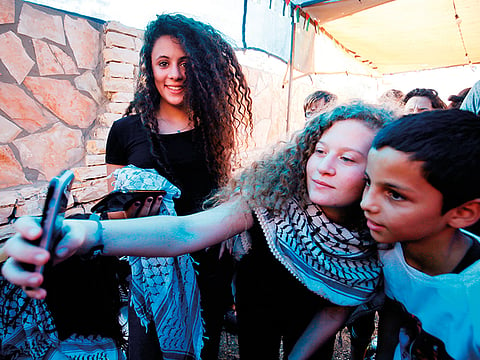After jail release, Tamimi considers law study
Her release comes as Palestinian hopes for independent state appear dimmer than ever

Nabi Saleh, West Bank: Palestinian teen Ahed Tamimi, who became an international symbol of resistance to Israeli occupation after slapping two regime soldiers, walked out of an Israeli prison on Sunday and told throngs of journalists and well-wishers that she now wants to study law to defend her people.
The curly haired 17-year-old said that “resistance continues until the occupation is removed,” but refrained from saying she would slap occupation soldiers again. The teen, who is on probation, said her eight months in prison were tough and helped her appreciate life.
At an outdoor news conference near her family home, she spoke against the backdrop of a large model of a slingshot that was “loaded” with a pencil rather than a stone, apparently to highlight education as one of the possible Palestinian tactics.
Underlying her case are clashing narratives about Israel’s half-century rule over the Palestinians, the extent of permissible Palestinian resistance to it and the battle for global public opinion.
Tamimi’s supporters see a brave girl who struck two armed occupation soldiers in frustration after having just learned that Israeli regime troops seriously wounded a 15-year-old cousin, shooting him in the head from close range with a rubber-coated steel bullet during nearby stone-throwing clashes.
The Israeli regime has treated her actions as a criminal offence, indicting her on charges of assault and incitement. In liberal circles, the hard-charging prosecution of Tamimi was criticised as a public relations disaster because it turned her into an international icon.
Her release comes at a time when Palestinian hopes for an independent state appear dimmer than ever.
Israeli-Palestinian talks on setting up a state in lands captured and occupied by Israel in 1967 — the West Bank, the Gaza Strip and East Jerusalem — have been deadlocked since hard-line Israeli Prime Minister Benjamin Netanyahu came to power in 2009. Palestinian President Mahmoud Abbas suspended contacts with the US after President Donald Trump recognised occupied Jerusalem as Israel’s capital in December in what Palestinians denounced as a display of blatant pro-Israel bias. Abbas, meanwhile, has stepped up financial pressure on Gaza, controlled since 2007 by his bitter domestic rival, Hamas.
Many Palestinians are disillusioned by their leaders in both political camps and feel exhausted after years of conflict with Israel. Alternatives have arisen, including calling for a single state for both peoples between the Jordan River and the Mediterranean, but haven’t gained a mass following.
In this context, the idea of so-called popular resistance — regular demonstrations, including stone-throwing by unarmed protesters — has only caught on in a few West Bank villages, including Nabi Saleh, home to the extended Tamimi clan.
Since 2009, residents of Nabi Saleh have staged regular anti-occupation protests that often ended with stone-throwing clashes. Tamimi has participated in such marches from a young age and has had several highly publicised run-ins with occupation soldiers. One photo shows the then 12-year-old raising a clenched fist towards an occupation soldier towering over her.
Visas cancelled
In a sign of her popularity, a pair of Italian artists painted a large mural of her on Israel’s West Bank wall ahead of her release.
Israeli occupation police said they were caught in the act along with another Palestinian and arrested for vandalism. On Sunday, Israel regime cancelled the visas of the two Italians and ordered them to leave the country within three days, police said.
In an afternoon news conference, Tamimi said that she completed her high school exams in prison, with the help of other prisoners. Palestinian inmates typically organise study courses to complete high school and even university degrees.
“I will study law to defend my people and defend my Palestinian cause in international forums,” she said.
She said her prison experience was tough, and that she missed her old life in the village and her friends. She said she underwent three lengthy interrogations without a female officer present, in violation of Israel’s own rules.
At one point on Sunday, Tamimi received a call from Turkish President Recep Tayyip Erdogan, who congratulated her on her release, said her father.



